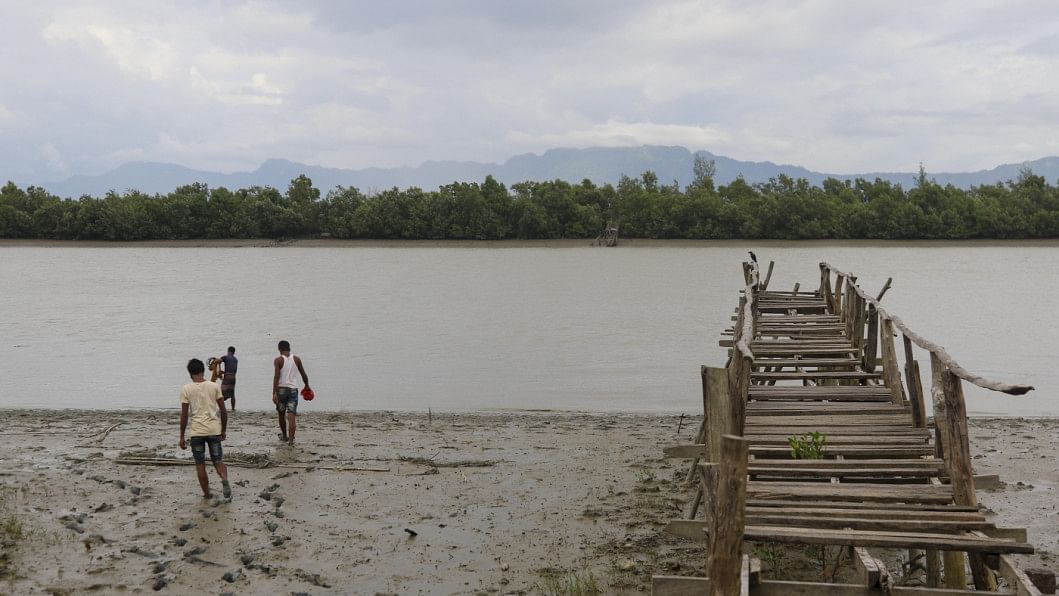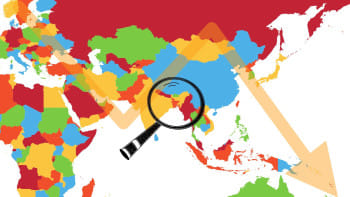Reassessing our southern defense strategy

Bangladesh's security concerns have historically been shaped by its relationship with India, particularly when the governing regime maintained strong ties with New Delhi, reflecting the enduring and complex historical dynamics between the two nations. This evolving security landscape now demands a shift in strategic focus. Recent developments along the southern border, particularly from Myanmar and non-state actors, indicate an urgent need to reassess the country's defense and diplomatic approaches. The rise of armed insurgent groups, border violations, and disruptions to trade highlight the vulnerabilities of Bangladesh's southern frontier. In response to these emerging threats, a new security paradigm—the Southern Contingency Framework (SCF)—is necessary to address these challenges effectively.
The China-India rivalry and Bangladesh's strategic dilemma
Bangladesh's geopolitical landscape has been linked to the ongoing rivalry between China and India. Both regional powers have vested interests in South Asia, often influencing Bangladesh's security, economic policies, and foreign relations. China has invested in Bangladesh's infrastructure through the Belt and Road Initiative (BRI), while India has historically played a crucial role in Bangladesh's defense and diplomatic affairs. The Myanmar crisis further complicates this dynamic, as China has maintained close ties with Myanmar's military regime, while India has historically supported certain movements within Myanmar. These competing influences leave Bangladesh in a precarious position, requiring a carefully balanced foreign policy that prioritises national security while maintaining strategic autonomy.
The escalating security crisis in the south
Tensions involving Myanmar affecting southern Bangladesh have long existed but have recently intensified to a concerning level. On October 27, 2023, the Three Brotherhood Alliance (3BTA), which includes the Arakan Army (AA), launched Operation 1027 against Myanmar's military, capturing significant territory in Rakhine State. The growing instability along the Myanmar border quickly spilled over into Bangladesh, as seen on February 4-5, 2024, when over 100 Myanmar Border Guard Police (BGP) personnel illegally crossed into Bangladesh and were disarmed and interned by the Border Guard Bangladesh (BGB). The situation further deteriorated on May 22, 2024, when the AA launched a large-scale attack on Maungdaw, seizing over 10 junta camps and killing approximately 200 Myanmar military personnel. This escalation posed direct risks to Bangladesh's territorial integrity and border security.
The security threats extended to the maritime domain. On June 6, 2024, ferry services on the Teknaf-Saint Martin route were suspended due to gunfire from Myanmar, leaving over 10,000 residents facing food shortages. That same month, AA fighters allegedly fired at Bangladeshi trawlers, including one carrying election officials. These hostilities continued into October when the Myanmar Navy fired on six Bangladeshi fishing trawlers near Saint Martin's Island, killing one person and injuring two. Although Myanmar authorities later released 72 detained fishermen and their trawlers on October 10, 2024, the situation underscored the fragile nature of Bangladesh's southern security.
By November 2024, the crisis had escalated further. On November 5, the AA detained 20 Bangladeshi fishermen and seized 15 boats, accusing them of illegal entry. Although the fishermen were released on November 7 after negotiations with the BGB, this episode demonstrated the group's growing power in the region. The most alarming development came on December 8, 2024, when the AA announced its control over the entire 271-kilometre Myanmar-Bangladesh border after capturing a BGP base in Rakhine State. This takeover led to an indefinite ban on vessel movement in the Naf River, disrupting trade between the two countries.
The economic ramifications of this crisis became evident in 2025. On January 16, the AA seized three cargo ships carrying 50,000 bags of dried fruits, betel nuts, coffee, and other goods en route from Yangon to Teknaf via the Naf River. Two of the three vessels were released on January 20, while the last ship remained in AA custody until February 1. Meanwhile, on February 10, the AA seized another timber-laden trawler near Golar Chor in Shah Porir Island. The next day, four Bangladeshi fishermen were abducted along with their fishing boat from the Naf River in Teknaf, Cox's Bazar.
March 2025 witnessed further complications. On March 1, Bangladesh's Home Adviser Lt Gen (retd) Jahangir Alam Chowdhury, confirmed that the AA had begun collecting an unofficial "tariff" on goods entering Bangladesh, adding another layer of economic insecurity. On March 5-6, the Myanmar Navy reportedly detained 56 Bangladeshi fishermen along with six trawlers near Saint Martin's Island. Before releasing them, the navy looted fish, fuel, nets, and food supplies. Further tension arose on March 16 when ARSA chief Ataullah Abu Ammar Jununi was arrested in Narayanganj, sparking unrest in Rohingya camps. On March 21, gunfire from Myanmar injured two individuals in the Tumbru border area in Bandarban, allegedly coming from the AA. The security situation had significantly deteriorated, leaving Bangladesh to confront an entirely new set of security concerns from the south.
Trade between Bangladesh and Myanmar also suffered due to the border instability. According to Teknaf customs, in the fiscal year 2023, Bangladesh imported 188,999 metric tonnes of goods worth Tk 1,545 crore from Myanmar. By the fiscal year 2024, imports had sharply declined to 71,741 metric tonnes, valued at Tk 808 crore. This decline underscores the economic vulnerabilities linked to border insecurity.
Some key theories of security and strategic studies—Realism, Securitisation Theory, and Regional Security Complex Theory (RSCT)—offer valuable insights but present limitations in fully addressing the emerging threats in Bangladesh's southern frontier. Realism, which prioritises state-centric power politics and military preparedness, provides an essential framework for understanding geopolitical tensions. It primarily focuses on conventional state actors, making it less adaptable to addressing asymmetric security threats and non-state actors like the AA. The Securitisation Theory highlights how security threats are shaped through political discourse, aiding in understanding how Bangladesh frames its security concerns. Nevertheless, it does not offer direct policy mechanisms for managing concrete security risks beyond discursive practices. The RSCT explains Bangladesh's security challenges by situating them within the broader dynamics of South Asia, particularly the China-India-Myanmar triangle. While useful, this theory assumes that regional security is shaped predominantly by state interactions, overlooking the significant role of transnational insurgent groups and informal economic networks. Given these limitations, Bangladesh requires a more comprehensive and adaptive security approach, such as the SCF, which must comprehensively integrate military, diplomatic, economic, and community-driven strategies to address evolving security threats effectively.
SCF can provide a multi-pronged approach
Firstly, Bangladesh must deploy advanced surveillance technology, including drones and satellite monitoring, to enhance situational awareness along the Myanmar border. Additionally, fortifying border security posts and increasing the presence of the BGB and the Bangladesh Navy will serve as deterrents against incursions. Presence does not always necessitate a physical deployment in all operational contexts.
Secondly, the Bangladesh Armed Forces should conduct more joint military exercises with friendly nations to improve rapid response capabilities. Strengthening naval and coast guard operations near Saint Martin's Island is essential.
Thirdly, Bangladesh should leverage diplomatic channels, particularly through the Association of Southeast Asian Nations (ASEAN) and the United Nations, to address cross-border tensions. Engaging China and India (on equal terms) in diplomatic dialogues to ensure Myanmar's stability will be crucial in preventing further escalation.
Fourthly, to mitigate economic risks, Bangladesh should reduce its reliance on Myanmar for imports and explore alternative trade routes. Strengthening domestic fisheries, agriculture, and logistics infrastructure will help absorb trade shocks caused by border disruptions.
Fifthly, we need to increase focus on community-based security and intelligence gathering. Local communities near the border should be integrated into intelligence-sharing networks. Establishing rapid communication channels between security forces and residents will enhance early threat detection and crisis response.
Finally, Bangladesh should focus on exploring innovative methods to engage with non-state actors following the UN Charter. The Charter encourages peaceful dialogue and conflict resolution through mechanisms such as Article 33 (negotiation and mediation) and Chapter VIII (regional arrangements). By leveraging these provisions, Bangladesh can establish new avenues for communication with non-state actors while ensuring compliance with international norms and advancing its security and strategic interests. This approach can boost broader regional stability and enhance Bangladesh's diplomatic capabilities.
Bangladesh's security posture must evolve to address the emerging threats from the south. The SCF offers a comprehensive strategy to safeguard national security, economic stability, and regional influence. By strengthening border defense, military preparedness, diplomatic engagement, trade security, and community intelligence, Bangladesh can effectively mitigate the risks posed by the ongoing instability in Myanmar. As regional dynamics continue to shift, Bangladesh must remain proactive in securing its sovereignty and national interests.
Alauddin Mohammad is joint member secretary of National Citizen Party (NCP).
Views expressed in this article are the auhtor's own.
Follow The Daily Star Opinion on Facebook for the latest opinions, commentaries and analyses by experts and professionals. To contribute your article or letter to The Daily Star Opinion, see our guidelines for submission.

 For all latest news, follow The Daily Star's Google News channel.
For all latest news, follow The Daily Star's Google News channel. 




Comments